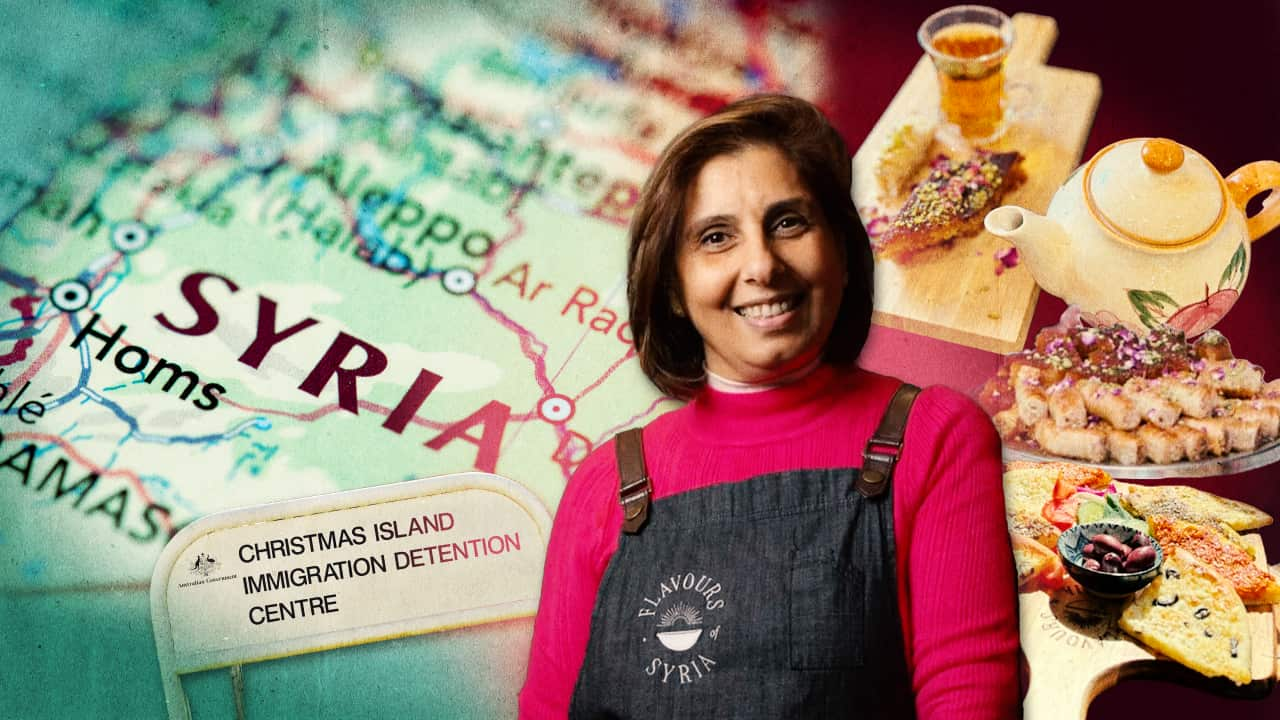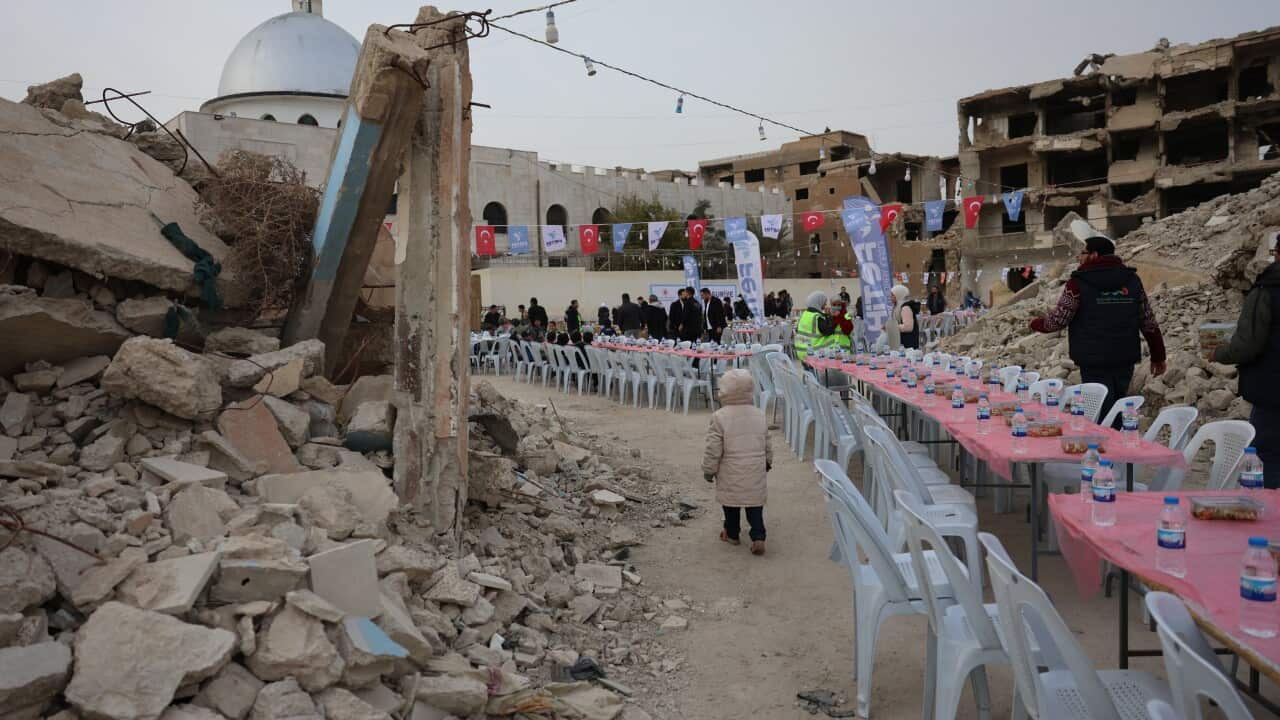SBS Arabic24 spoke with Mahmoud Moussa, 46, an Egyptian living in Greece who was granted Greek citizenship for his rescue efforts during the 2018 Attica wildfires, which .
On July 23, residents of the coastal village of Mati, where Mr Moussa had lived for more than 30 years, were forced to abandon their homes and flee towards the sea after wildfires had devoured the surrounding countryside.
Forced to flee and sensing the panic, Mr Moussa and fellow migrants, Egyptian Emad el-Khaimi and Albanian Gani Xheka, went out on their boats and began pulling people from the waves.
“I rescued 73 people and four dogs in two trips," Mr Moussa said.
"First I got 23 persons and 4 dogs to the land. Then I went back to get another 50 people.”
The three men were 

In this Monday, July 23, 2018 image from video, people escaping wildfires wade into the waters of the "Silver Coast" beach in Mati. Source: Elia Kallia
'I wasn’t the only one who helped'
Looking back on the episode, Mr Moussa said he feared that the people who were forced into the sea would suffocate and drown.
He described the conditions during the rescue as “hell”, but said he needed to act quickly to save lives.
“When I knew that people fled and threw themselves in the sea, I took the boat right away and I was the first to arrive for the rescue,” he said. Other fishermen and the Greek navy then joined the rescue efforts.
Other fishermen and the Greek navy then joined the rescue efforts.

Pictures of burnt Mati and Neos Voutsas from an airplane window after take off, the area is in eastern Attica near Athens after the fire. Source: Getty
“During the rescue, I started a live video on Facebook," he said. "It got lots of engagement from my Egyptian and Greek friends,” he said.
Following the rescue, Mr Moussa's local MP told him that Greece's Prime Minister Alexis Tsipras wanted to meet the trio personally to thank them for their efforts.
“I met Tsipras, and he thanked us for the rescue efforts, I wasn’t the only one who helped," he said.
"The president said that the least he can give us is the Greek citizenship.” Mr Moussa then received an invitation to Join Mr Tsipras and his wife for a New Year’s dinner and two days later the group was awarded Greek citizenship by President Prokopis Pavlopoulos.
Mr Moussa then received an invitation to Join Mr Tsipras and his wife for a New Year’s dinner and two days later the group was awarded Greek citizenship by President Prokopis Pavlopoulos.

Mahmoud Moussa and Greece's PM Alexis Tsipras. Image: Mahmoud Moussa Source: Mahmoud Moussa
“He gave such a beautiful speech where he said that Greece as government and people are in debt to us,” Mr Moussa said. Mr Moussa said the aspect which was most important for him, was the circumstances in which he received citizenship.
Mr Moussa said the aspect which was most important for him, was the circumstances in which he received citizenship.

Greek President Prokopis Pavlopoulos (second left) honoring Mahmoud Moussa (far right) and the other migrants at the presidential palace. Source: Supplied
“I am more happy about the way we were granted the citizenship," he said. "It was a gift for a good deed we did.”
He said the episode made him a local celebrity in Mati, saying “sometimes I go to a restaurant or someplace and they refuse to take money from me". He said a taxi driver in Athens once stopped him to take pictures with him.
He said a taxi driver in Athens once stopped him to take pictures with him.

Mahmoud Moussa in Greece in 2019 (L) and during his youth in Egypt. Source: Supplied
Mr Moussa arrived in Greece more than 30 years ago from his Egyptian hometown along the Mediterranean Sea. He was only 16 at the time.
“People from my town used to go to Greece to work in fishing, 20 years before I went.”
He settled in Mati, the village where he has spent the majority of his life. The Tsipris government came to power in 2015, the same year that the country witnessed an unprecedented wave of migrants via the Mediterranean, from various zones of conflict.
The Tsipris government came to power in 2015, the same year that the country witnessed an unprecedented wave of migrants via the Mediterranean, from various zones of conflict.

Collage of media appearances by Mahmoud Moussa. Source: Supplied
Greece was one of the main arrival points for asylum seekers, which has been a point of contention for some island residents.
Clashes even broke out between in April. President Pavlopoulos used the story of the three fishermen to address the issue of migration.
President Pavlopoulos used the story of the three fishermen to address the issue of migration.

Combined photo showing Mahmoud Moussa during his early days as a fisherman in Greece. Source: Mahmoud Moussa
“What you did proves that humanity and solidarity is not a matter of nationality but of the soul,” Mr Pavlopoulos told the trio.
“As such, you can teach, some of our European partners who do not grasp the values of Europe.”




